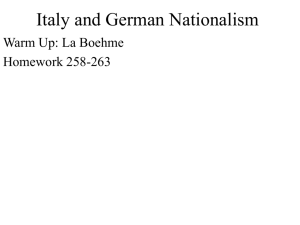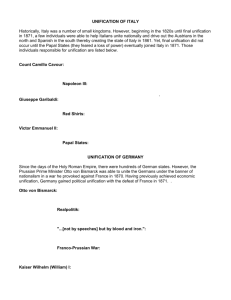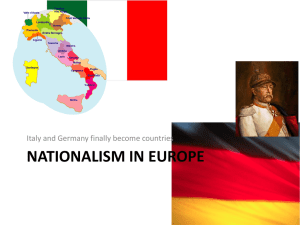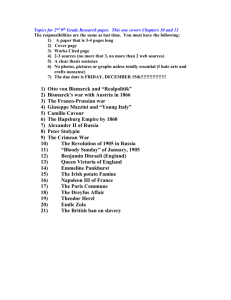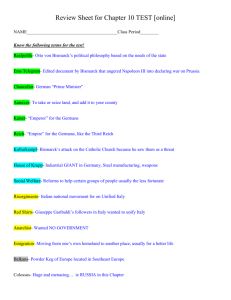Nationalist_Movements
advertisement
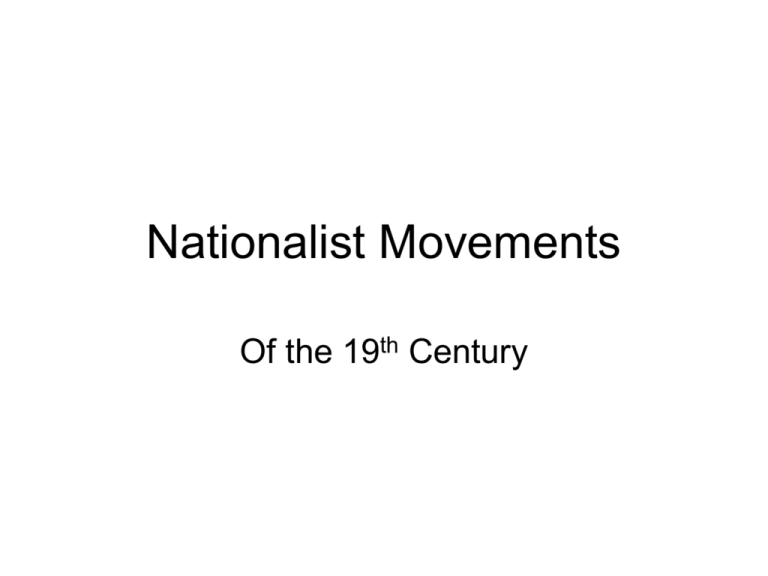
Nationalist Movements Of the 19th Century Aim: How can nationalism be a uniting and divisive force? (19th century nationalist Movements) Vocabulary: nationalism, communion, annex, realpolitik, blood and iron, Zionism, anti-semitism Joseph MazziniAn Essay on the Duties of Man Addressed to Workingmen (1858) “Country is not only a mere zone of territory. The true Country is the Idea to which it gives birth; it is the Thought of love, the sense of communion which unites in one all the sons of that territory.” Q: Why do you think Mazzini is known as the “Soul” of the Italian unification movement? Hanover.edu Q: How does the Mazzini excerpt embody nationalism? Bonds That create Nationalism Nationality •Belief in a common ethnic ancestry Language •Can be different dialects, one chosen as “national language Culture •Shared way of life (food, dress, etc) History •A common past, common experiences Religion •A religion shared by most or all people Territory •A certain territory that belongs to them, its “land” Nation-State •Defends the nation’s territory and its way of life •Represents the nation to the rest of the world •Embodies the people and its ideas The major figures of Italian Unification • Mazzini- “The Soul” • Cavour- “The Brain” • Garibaldi- “The Sword” Mazzini Cavour Garibaldi http://www.italcultindia.com • Mazzini- wrote and spoke eloquently about his desire to see Italy unified. He began the Young Italy movement. • Cavour-successful diplomat, he convinced France to fight the Austrians. He expanded the power of Sardinia-Piedmont by adding other Italian states to it. • Garibaldi-He and his “Red Shirts” conquered southern Italy and joined it to the state Cavour had unified under the control of SardiniaPiedmont in the north. Obstacles to Unification Political Divisions • Kingdom of Sardinia-Piedmont-Italian control • Lombardy and Venetia-annexed to Austria • Duchies of Parma, Modena and Tuscany and the Kingdoms of the Two Sicilies (Naples)-Austrian control • Papal States-under Church control Opposition to Italian Unification Austria • Sought to discourage nationalist uprisings within their empire • Wanted to retain Lombardy and Venetia • Wanted to maintain influence in the duchies and Two Sicilies • Reactionary rulers feared unification Papal • Belief that a united Italy would end Pope’s rule over Papal States Discord among Nationalists • Mazzini and Garibaldi wanted a democratic Italian republic • Gioberti wanted an Italy under leadership of pope • Cavour wanted a liberal Italian monarchy Process of Italian Unification Until 1860 present-day Italy was composed of several small states and territories. In 1860 almost all of the states in northern Italy became part of the Kingdom of Sardinia. In 1861 the Kingdom of Sardinia was joined by all the southern states except Rome and became the Kingdom of Italy. In 1871 Rome joined the now-united Italy and became its capital. Encarta Which factors do you think promoted nationalism in Italy? • Glorious past of the Roman Empire and Renaissance • Resented subjugation to Austria • Desired unity The Many Sides and Policies of Otto von Bismarck “Germany is too small for the both of us!” Otto von Bismarck: Letter to Minister von Manteuffel, 1856 Because of the policy of Vienna [the Congress of Vienna, 1815], Germany is clearly too small for us both [Prussia and Austria]; as long as an honorable arrangement concerning the influence of each in Germany cannot be concluded and carried out, we will both plough the same disputed acre, and Austria will remain the only state to whom we can permanently lose or from whom we can permanently gain. . . .I wish only to express my conviction that, in the not too distant future, we shall have to fight for our existence against Austria and that it is not within our power to avoid that, since the course of events in Germany has no other solution. Fordham.edu Otto von Bismarck Speech to the Reichstag September 30, 1862 • “…It is true that we can hardly escape complications in Germany, although we do not seek them. Germany does not look to Prussia’s liberalism, but to her power…Prussia must collect her forces and hold them in reserve for an opportune moment…Not by speeches and majorities will the great questions of the day be decided…but by blood and iron.” Q: How does Bismarck promote the Use of Realpolitik in this speech? http://www.csustan.edu Realpolitik in History Can you think of other political/literary figures in world history who favored Realpolitik? • • This Harper's Weekly cartoon by Thomas Nast addresses the "Chancellor Crisis" of 1877, when German chancellor Otto von Bismarck took an extended leave of absence from his political duties. It was an act that caused great concern and uncertainly among many of the other world powers. The German phrase in the caption is part of the title "The Watch on the Rhine," a song popular with German soldiers during the FrancoPrussian War (1870-1871). The cartoonist has altered it to translate into "The Watch on Bismarck" to emphasize the message that the eyes of the world are watching what Bismarck will do next. Here, Bismarck sits leisurely smoking his pipe, with German beer and pretzels at the ready, while Emperor Franz Josef of Austria-Hungary and Prime Minister Benjamin Disraeli of Great Britain peer anxiously from beside and underneath the table, respectively. They are surrounded by other foreign figures or symbols, eager to catch a glimpse of Bismarck's movements. Along the wall on the left, they are (clockwise from the door): Turkey (Ottoman Empire), Russia, France (the hat upon a pole), King Victor Emmanuel II of Italy, and the miter of Pope Pius IX. In the tree are (left to right): China (hanging from the limb), Spain (bullfighter's hat), John Bull (staring into binoculars), an Irishman behind him, and the feathered head of a native (either African or Asian). The French figure lurking behind the tree on the far right is not identified. Harperweek.com Caring for the elderly Otto von Bismarck German Chancellor 1862-1890 • Germany became the first nation in the world to adopt an old-age social insurance program in 1889, designed by Germany's Chancellor, Otto von Bismarck. The idea was first put forward, at Bismarck's behest, in 1881 by Germany's Emperor, William the First, in a ground-breaking letter to the German Parliament. William wrote: ". . .those who are disabled from work by age and invalidity have a well-grounded claim to care from the state." Ssa.gov Unification of Germany http://astro.temple.edu Timeline of the Unification of Germany • Prussia victories: • The Danish War (1864) • The Austro-Prussian War a.k.a The 7 Weeks War (1866) • The Franco-Prussian War (1870-1871). • King (Kaiser) William I of Prussia became ruler of a united Germany in 1871. The Dreyfus Affair • Alfred Dreyfus, a Jewish captain in the French army was accused of giving military secrets to the Germans in 1894. • Due to rampant Anti-Semitism in France Dreyfus was found guilty of treason. • An official in the French army, Lieutenant Picquart, discovered evidence that Dreyfus was not the sabateur. • The army, however, was more interested in maintaining its image than convicting the real traitor, Walsin Esterhazy. • Theodore Herzl was a journalist who was present at Dreyfus’ trial. The trial had a profound effect on him and the Zionist movement was born. Zionism “We are a people-one people…in countries where we have lived down for centuries we are still cried down as strangers…no nation on earth has survived such struggles and sufferings and we have gone through…” -Theodore Herzl 1896 Q: Why was the establishment of a Jewish homeland necessary According to this passage? Fordham.edu Think of religious groups that have been persecuted throughout history and their responses to it: Compare the Nationalist Movements • In which ways was the Zionist nationalist movement similar to that of Germany and Italy? • How was Zionism different from the nationalist movements of Germany and Italy?
